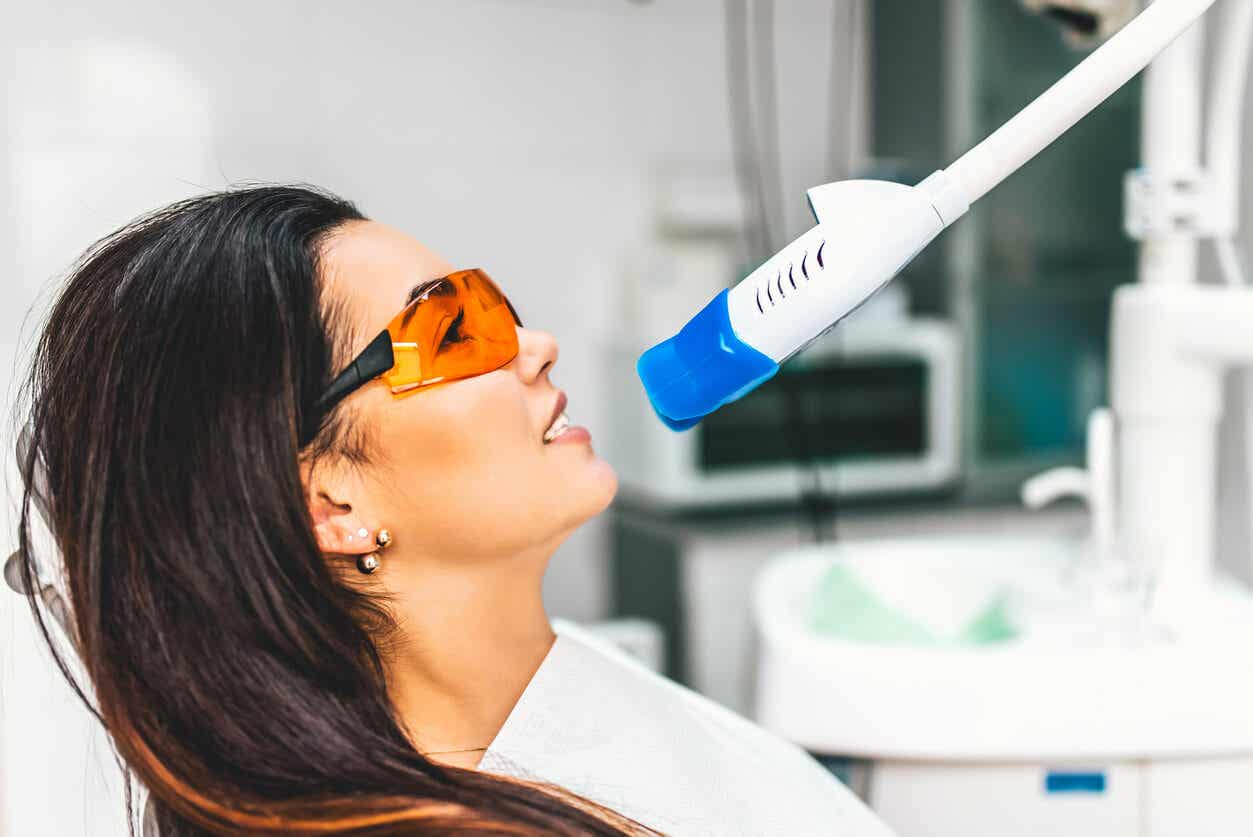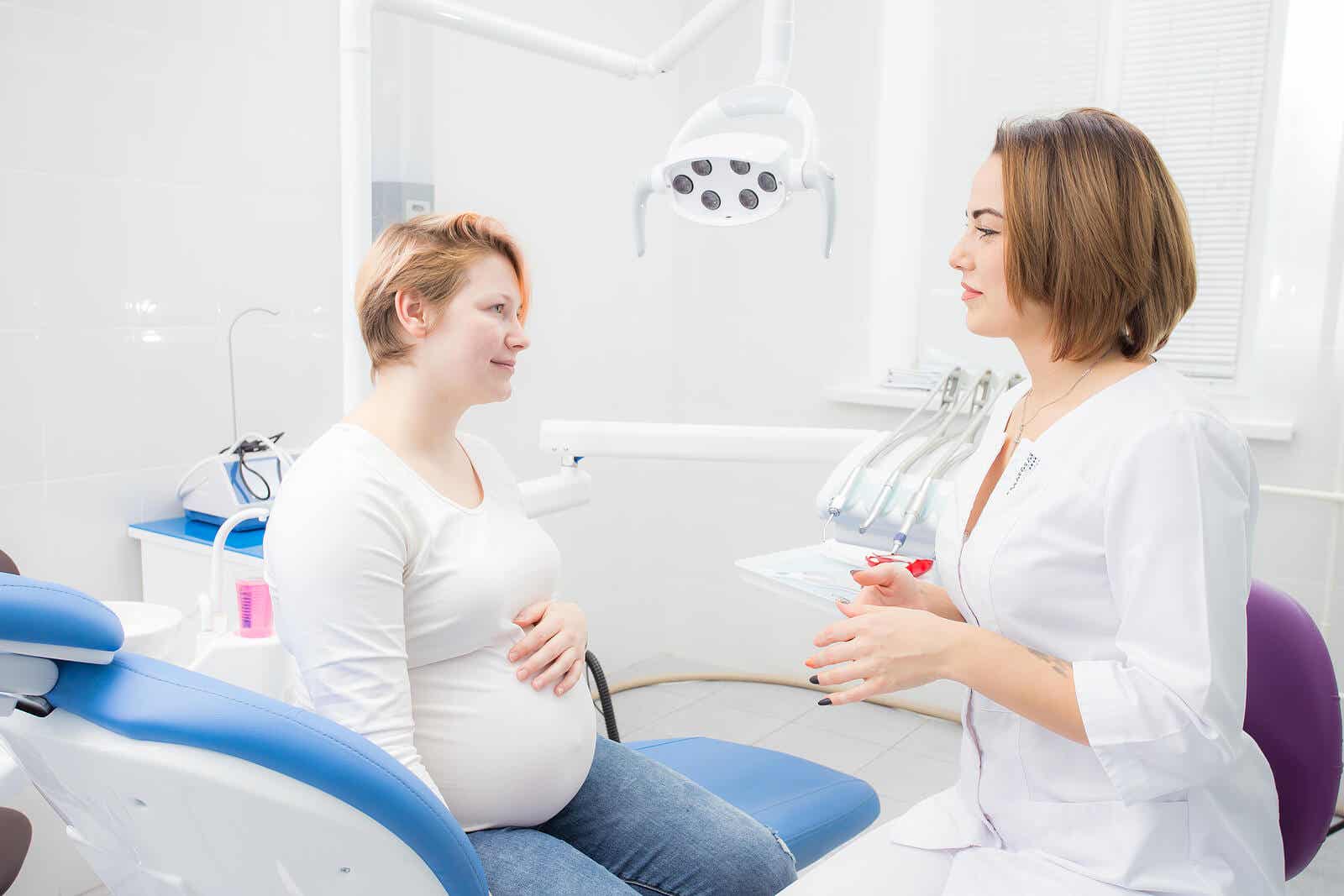Can I Get a Teeth Whitening Treatment During Pregnancy?

Nowadays, many people really care about having shiny white teeth. This is why future mothers also ask themselves “Can I get a teeth whitening treatment during pregnancy?”.
Teeth whitening is the most effective treatment to make your teeth look as bright as you want. However, women worry about the chemical substances used during the treatment. This is because they think these substances may affect the fetus. In this article, we’ll tell you everything you need to know about this practice during pregnancy.
Teeth whitening: When is it necessary?
Teeth have different colors, which vary among white, yellow, grey, and brown. This is because the enamel is semi-transparent, so we can see the dentin under it. In fact, the color of the dentin is what we actually see.
As time goes by, and due to different food and drink consumption, teeth get stains. Some stains originate within the tooth, but this isn’t very frequent.

Regular consumption of food with coloring products, like tomato sauce, blueberries, coffee, tea, mate (from South America), wine, and sodas contribute to teeth staining. For example, smoking tobacco gives teeth brown stains. Furthermore, poor dental hygiene and the accumulation of bacterial plaque promote teeth staining and their yellow appearance.
A solution to teeth stains is to get a teeth whitening treatment. Of course, the need for this treatment will depend on each person’s interest in their physical appearance, the color of their teeth, and their lifestyle. Therefore, many women ask themselves “Can I get a teeth whitening treatment during pregnancy?”.
What is teeth whitening?
As we’ve mentioned before, teeth whitening is a procedure dentists carry out to whiten teeth and give them back their shiny tonality. Its main goal is to treat stained or yellow teeth. It’s actually a cosmetic procedure.
During this treatment, many chemical substances are involved, such as hydrogen peroxide or carbamide peroxide, in different concentrations, depending on the needs of each case. These chemical agents are placed over the teeth. However, gum protection is very important while doing this.
There are different teeth whitening treatments:
- Teeth whitening at the dental office: In this case, dentists perform it at their office. First, they thoroughly clean the patient’s teeth and protect the gums. Then, they apply the whitening gel to the front teeth for a certain amount of time. Sometimes, people need two sessions. Finally, they perform a fluoride topication.
- Outpatient teeth whitening: In this case, patients go to the dentist’s office where the professional cleans their teeth and gives them a personalized teeth whitening tray. At home, the patient will use the whitening gel for 3 hours each day for a week or according to their doctor’s recommendations.
- Homemade remedies and methods: Different magazines or websites share homemade recipes to whiten your teeth. They usually include abrasives (activated charcoal or baking soda), fruit acids (orange or strawberry), and vinegar. Actually, the use of these substances can be quite risky because they may damage your enamel for good.
Can I whiten my teeth if I’m pregnant?
Now, it’s time to discuss the answer to this question. Remember that, during this treatment, you must apply chemical agents to your teeth. Even though these substances don’t seem to be toxic, due to ethical reasons, all the studies on their effects were carried out on non-pregnant people.

Therefore, there’s no evidence that proves that these substances could go through the placental barrier and hurt the fetus. This is why specialists don’t recommend teeth whitening during pregnancy. In fact, in order to take proper precautions, women shouldn’t whiten their teeth until they stop breastfeeding their babies. This is because lack of evidence makes it impossible for us to know how much of these substances get to the breastmilk.
“Due to the potential safety concerns regarding bleaching materials, pregnant women should delay any teeth whitening procedures”.
-American Dental Association-
Therefore, if you’re pregnant or breastfeeding your baby, you shouldn’t whiten your teeth. If you want to do it, you should wait until after your baby is born and is no longer breastfeeding. Or, you could have your teeth whitened before getting pregnant.
Take care of your smile during pregnancy
As we’ve mentioned before, there’s no evidence regarding the effects of teeth whitening during pregnancy. However, even though specialist don’t recommend it if you’re pregnant, you can still have a healthy smile. Remember that, during this stage, oral health isn’t only about beauty, it’s also about the future mother’s well-being and about preventing possible complications.
Brushing your teeth three times a day and using dental floss and fluoride paste are essential practices to take good care of your oral health. Moreover, you should avoid foods that stain your teeth and consuming too many sugar products, in order to prevent dental cavities.
Finally, if you want healthy teeth, you should visit the dentist every three months. Even though you can’t whiten your teeth during pregnancy, you should still try to have a healthy smile.
Nowadays, many people really care about having shiny white teeth. This is why future mothers also ask themselves “Can I get a teeth whitening treatment during pregnancy?”.
Teeth whitening is the most effective treatment to make your teeth look as bright as you want. However, women worry about the chemical substances used during the treatment. This is because they think these substances may affect the fetus. In this article, we’ll tell you everything you need to know about this practice during pregnancy.
Teeth whitening: When is it necessary?
Teeth have different colors, which vary among white, yellow, grey, and brown. This is because the enamel is semi-transparent, so we can see the dentin under it. In fact, the color of the dentin is what we actually see.
As time goes by, and due to different food and drink consumption, teeth get stains. Some stains originate within the tooth, but this isn’t very frequent.

Regular consumption of food with coloring products, like tomato sauce, blueberries, coffee, tea, mate (from South America), wine, and sodas contribute to teeth staining. For example, smoking tobacco gives teeth brown stains. Furthermore, poor dental hygiene and the accumulation of bacterial plaque promote teeth staining and their yellow appearance.
A solution to teeth stains is to get a teeth whitening treatment. Of course, the need for this treatment will depend on each person’s interest in their physical appearance, the color of their teeth, and their lifestyle. Therefore, many women ask themselves “Can I get a teeth whitening treatment during pregnancy?”.
What is teeth whitening?
As we’ve mentioned before, teeth whitening is a procedure dentists carry out to whiten teeth and give them back their shiny tonality. Its main goal is to treat stained or yellow teeth. It’s actually a cosmetic procedure.
During this treatment, many chemical substances are involved, such as hydrogen peroxide or carbamide peroxide, in different concentrations, depending on the needs of each case. These chemical agents are placed over the teeth. However, gum protection is very important while doing this.
There are different teeth whitening treatments:
- Teeth whitening at the dental office: In this case, dentists perform it at their office. First, they thoroughly clean the patient’s teeth and protect the gums. Then, they apply the whitening gel to the front teeth for a certain amount of time. Sometimes, people need two sessions. Finally, they perform a fluoride topication.
- Outpatient teeth whitening: In this case, patients go to the dentist’s office where the professional cleans their teeth and gives them a personalized teeth whitening tray. At home, the patient will use the whitening gel for 3 hours each day for a week or according to their doctor’s recommendations.
- Homemade remedies and methods: Different magazines or websites share homemade recipes to whiten your teeth. They usually include abrasives (activated charcoal or baking soda), fruit acids (orange or strawberry), and vinegar. Actually, the use of these substances can be quite risky because they may damage your enamel for good.
Can I whiten my teeth if I’m pregnant?
Now, it’s time to discuss the answer to this question. Remember that, during this treatment, you must apply chemical agents to your teeth. Even though these substances don’t seem to be toxic, due to ethical reasons, all the studies on their effects were carried out on non-pregnant people.

Therefore, there’s no evidence that proves that these substances could go through the placental barrier and hurt the fetus. This is why specialists don’t recommend teeth whitening during pregnancy. In fact, in order to take proper precautions, women shouldn’t whiten their teeth until they stop breastfeeding their babies. This is because lack of evidence makes it impossible for us to know how much of these substances get to the breastmilk.
“Due to the potential safety concerns regarding bleaching materials, pregnant women should delay any teeth whitening procedures”.
-American Dental Association-
Therefore, if you’re pregnant or breastfeeding your baby, you shouldn’t whiten your teeth. If you want to do it, you should wait until after your baby is born and is no longer breastfeeding. Or, you could have your teeth whitened before getting pregnant.
Take care of your smile during pregnancy
As we’ve mentioned before, there’s no evidence regarding the effects of teeth whitening during pregnancy. However, even though specialist don’t recommend it if you’re pregnant, you can still have a healthy smile. Remember that, during this stage, oral health isn’t only about beauty, it’s also about the future mother’s well-being and about preventing possible complications.
Brushing your teeth three times a day and using dental floss and fluoride paste are essential practices to take good care of your oral health. Moreover, you should avoid foods that stain your teeth and consuming too many sugar products, in order to prevent dental cavities.
Finally, if you want healthy teeth, you should visit the dentist every three months. Even though you can’t whiten your teeth during pregnancy, you should still try to have a healthy smile.
All cited sources were thoroughly reviewed by our team to ensure their quality, reliability, currency, and validity. The bibliography of this article was considered reliable and of academic or scientific accuracy.
- Alonso, María Jimena. Blanqueamiento dental interno mediante técnica ambulatoria. Diss. Universidad Nacional de Cuyo. Facultad de Odontología, 2020.
- Jaramillo Moncada, Joel David. Blanqueamiento dental con peróxido de carbamida. BS thesis. Universidad de Guayaquil. Facultad Piloto de Odontología, 2019.
- Mathew, Robina Rose, and Devendra Chaudhary. “Dental health care protocols during pregnancy.”
- Medellín López, Paula, and Aremy Mizraim Lemus Cortés. 4 técnicas de blanqueamiento dental. BS thesis. Benemérita Universidad Autónoma de Puebla, 2017. https://repositorioinstitucional.buap.mx/handle/20.500.12371/8090
- Moradas Estrada, Marcos, and Beatriz Álvarez López. “Manchas dentales extrínsecas y sus posibles relaciones con los materiales blanqueantes.” Avances en odontoestomatología 34.2 (2018): 59-71. https://scielo.isciii.es/scielo.php?pid=S0213-12852018000200002&script=sci_arttext&tlng=en
- Thakur, Vishal, et al. “Pregnancy & Oral Health and Dental Management in Pregnant Patient.” Journal of Current Medical Research and Opinion 3.11 (2020): 724-731.
- Covarrubias, A. G. M., Peña, M. A. C., Maya, R. M., Balderas, S. A. E., Cabriales, V. C. T., & Lara, C. A. L. (2011). Efecto del blanqueamiento con peróxido de hidrógeno al 38% sobre la micoestructura del esmalte dental. Oral, 12(36), 687-690. https://www.medigraphic.com/pdfs/oral/ora-2011/ora1136h.pdf
This text is provided for informational purposes only and does not replace consultation with a professional. If in doubt, consult your specialist.








